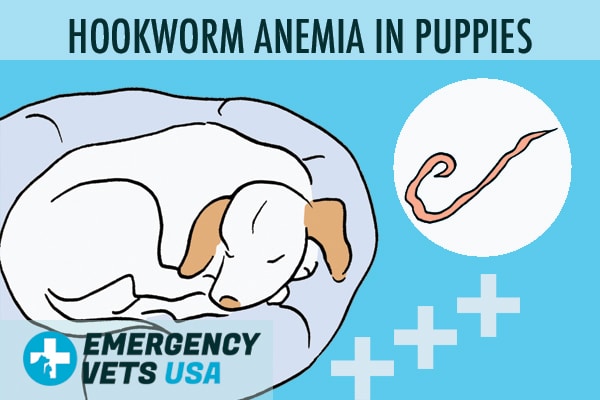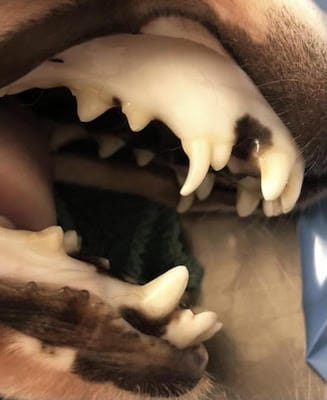What Is Hookworm Anemia In Puppies
Hookworm anemia is a preventable condition that takes the lives of puppies around the world.
Anemia in itself is fatal when left untreated, but the addition of diarrhea and vomiting can set a puppy over the edge.
So what is hookworm anemia, and how can you protect your puppy from this deadly condition?
In this article we will go into the details of hookworm infections in dogs, and help you better understand how you can keep your pup safe going forward.

What Are Hookworms?
Canine hookworms (Ancylostoma caninum) are an intestinal parasite that wreak more havoc than the average parasite.
Unlike other intestinal parasites, hookworms have a hook-like mouth that allows them to latch onto a dog’s intestinal lining.
Not only do they make themselves at home within the intestines, but they ingest blood from the surrounding vessels.
Just one hookworm can take in a large amount of blood and cause inflammation to the intestinal tissue, so you can imagine how serious a parasitic infection can be.
Why Are Hookworms Such A Serious Issue In Puppies?
Any type of intestinal parasite can lead to severe GI upset in puppies, but the presence of hookworms is especially concerning for two reasons.
First, a hookworm infection in puppies can lead to significant anemia in the puppy affected. Anemia is a term used to describe a decrease in circulating red blood cells within the vessels, causing an array of life-threatening complications to follow.
Not only can hookworms cause anemia in puppies, but they can cause irritation of the intestinal lining over time.
Hookworms latch onto a dog’s intestines with their hook-like mouths, causing damage to the intestines at each spot of contact.
This inflammation can not only worsen any diarrhea or vomiting present, but it can cause significant abdominal pain.
Are Hookworms Common In Puppies?
Unfortunately, hookworms are common in our growing canine friends. Hookworms are one of the most common intestinal parasites we see in the puppy population, as they can easily be transmitted from the mother in utero or through their milk.
Hookworms and other intestinal parasites are such a realistic threat, that most breeders begin the deworming process as early as two weeks.
No matter how healthy a puppy may seem, all puppies should be dewormed for good measure.
How Do Puppies Get Hookworms?
Part of what makes hookworms so common in puppies is the fact that they can acquire these parasites in multiple ways.
To help you better understand how our pups fall victim to these blood sucking parasites, let’s list a few of the most common transmission routes below.
Puppies can become infected with hookworms through the following routes:
- In utero with an infected mother
- Through an infected mother’s milk
- By ingesting infected feces
- Through the skin when in contact with infected soil
When an infected dog sheds hookworm eggs in their stool, these eggs can remain present in the environment for weeks.
This means that puppies can infect themselves when digging in infected soil, or even by licking their paws after the activity.
Hookworms are everywhere in the world around our pups, making it such an important threat to be aware of.
Once the hookworm or hookworm eggs have entered the body, they begin the journey to the dog’s intestines.
If a puppy is infected with hookworms by ingesting them, the parasites will quickly make their way to the intestinal tract to finish their maturation process.
If the hookworms have entered the dog’s body through the skin, they will travel from the bloodstream, to the lungs, and eventually reach their final destination in the intestines.
Once these parasites mature in the intestines, they begin the process of hooking onto the intestinal lining.
It’s important to note that some hookworms can make their way to various tissues throughout the body.
These parasites can remain dormant in a dog’s muscles, only to reactivate at a later time. This is why it is so important to deworm puppies even if symptoms of a parasitic infection are not present.
Symptoms Of Hookworms In Puppies
If your puppy has an active hookworm infection, there are a few common signs and symptoms that may develop.
Ranging from diarrhea to extreme lethargy, every puppy will vary based on the severity of their case.
Some of the standard symptoms of hookworms in puppies include:
- Diarrhea
- Vomiting
- Bloody diarrhea
- Black tar diarrhea
- Lethargy
- Weight loss
- Anorexia
- Pale gums
- Poor growth
- Dull coat
- Extreme weakness
- Collapse
- Death
The subsequent anemia from a hookworm infection is what makes these critters so dangerous to our canine friends.

Not only will the hookworms ingest blood from the vessels in the intestinal lining, but they also inject an anticoagulant with each bite.
This means that not only can blood flow freely into the feeding hookworm, but the site can continue to bleed once the hookworm moves on.
This combination of possibilities will lead to fatal blood loss over time.
Diagnosing Hookworm Anemia In Puppies
Diagnosing hookworms in a puppy is fairly easy and straightforward in most cases.
A simple fecal flotation will allow your veterinarian or veterinary technician to search for the presence of eggs under a microscope, needing only a small sample of fresh stool to complete.
Hookworms are easily detected in most fecal floats, so misdiagnosis is not a cause of concern in most situations.
Most owners do not see any evidence of live hookworms in their dog’s stool or vomit.
Hookworms attach themselves firmly to the intestinal lining, making it rare to see them passed in standard stool production.
This is why many owners are unaware of their pup’s current hookworm infection until their pups are experiencing obvious symptoms, as listed above.
Treating Hookworm Anemia In Puppies
When simply treating the hookworm infection in a puppy, your veterinarian will likely prescribe an anthelmintic called Panacur (fenbendazole).
There are other deworming medications that can target hookworms in dogs, but this is the most common treatment method in most animal hospitals.
Though this medication will eliminate the hookworms, it will not treat any current anemia that is present. If a puppy is severely anemic, your vet will need to address the anemia separately.
For cases of mild hookworm anemia in puppies, your veterinarian may prescribe an iron supplement in addition to their deworming medication of choice.
This can help to stimulate red blood cell production in the weeks following their diagnosis. However, this may not be successful in cases of severe hookworm anemia.
If your puppy is experiencing life threatening anemia due to their current hookworm infection, your veterinarian may suggest a blood transfusion.
A blood transfusion is a procedure that involves transfusing your puppy with whole blood of a matched blood type, facilitating a life-saving replenishment of circulating red blood cells.
Anemia is a serious health threat that can make it challenging to transport oxygen throughout the body, so it must be addressed in severe cases.
No matter how severe your puppy’s hookworm anemia was at the time of diagnosis, it’s important to deworm your puppy once again in about 2-3 weeks after the initial treatment.
It can take about two weeks for any existing eggs or larvae to mature in the intestines, making it important to kill any existing hookworms if they are present.
If your puppy is not dewormed a second time for good measure, they may experience hookworm anemia again down the line.
Will My Puppy Survive Hookworm Anemia?
When treating hookworm anemia at the first sign of symptoms, most puppies can make a full recovery.
Puppies that only need deworming medications and iron supplements have a great chance at a full recovery, while those requiring a blood transfusion have a more guarded prognosis.
No matter the severity of the case, fast action is essential for giving your pup the best chance of surviving this condition.
Preventing Hookworm Anemia In Puppies
Preventing hookworm anemia in puppies is as easy as deworming them from the moment they enter your home, as well as keeping up with monthly heartworm prevention.
Most puppy packages at animal hospitals will include a standard deworming package, as this treatment is easily accessible and affordable.
Once your pup is old enough to begin their monthly heartworm prevention, this should take care of any future exposure.
Final Thoughts
Hookworm anemia can range in severity based on how long the parasitic infection is brewing.
As long as you have your pup seen at the first sign of GI upset, you should be able to prevent any life-threatening anemia in the future.

My name is Amber. I am a dedicated animal lover that turned my passion into my career. I am a Licensed Vet Tech with 12 years of experience in veterinary medicine, but I recently took my career online to help spread accurate information on animal care. With how vast the online world is, I have a strong desire to ensure that the reader always walks away with helpful pet advice. With the experience I’ve gained from my time in this field, I have been able to travel the world, offering my services to as many animal rescues as I can find. If I am not at my laptop, or back home visiting family, you can find me somewhere in the world, cuddling every furry friend that I can find! More About Us
